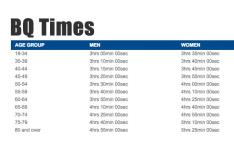Go Long
It is possible to train for a half or even a full marathon on three to four days of training a week as long as your goal is to finish and not PR. The biggest challenge for the time-pressed is carving out the hours for the long run, for which there is no substitute, says Smith. "Protect that time like you would anything else that you consider important."
More: 7 Ways to Improve Your Half Marathon Training
Minimalist plan Do two 30- to 45-minute runs and one long run. The shorter runs help your muscles and bones absorb the impact of the long run and get stronger. "If you do something once a week, your body tends to think it was a bizarre one-off occurrence and doesn't bother to adapt to it," says Leivers. The long runs will build strength, stamina, and endurance, and teach your body to run on depleted fuel, says Smith. Increase the distance by no more than 10 to 15 per-cent each week.
To avoid injury, consider alternating between weeks when you add miles to your long run with weeks where you add miles to other workouts and keep the long run mileage the same, says Smith. (And always follow the 10 Laws of Injury Prevention.) An abbreviated weekly schedule may require you to extend the overall training period to safely work up to a half or full marathon. For instance, you may need 20 weeks rather than the typical 16 to prep for 26.2.
More: 9 Running Injury Prevention Tips
Get Consistent
Running regularly isn't just a challenge for beginners; even seasoned racers have lapses. But establishing a base of four to eight weeks of consistent running lays the groundwork for your future speed or distance goals, says Jennifer Gill, M.P.H., an RRCA-certified running coach and founder and president of Sole Health and Wellness in San Diego.
More: 27 Ways to Run Better Everyday
Minimalist plan Run three times a week as time allows—even when that means running two days in a row. "People plan to do too much, and if they can't reach that ideal, they start to do nothing," says Leivers. A 20- to 30-minute run is sufficient for boosting muscle strength and aerobic capacity, but even a quick 15-minute jog around the soccer field while your kid practices helps. Try to establish one day per week that is always a run day (weekends are good for this). Give up the perfectionism runners often cling to, Leivers says, and you're more likely to gain the physical and mental benefits of the sport that will keep you hooked and running for good.
More: 6 Tips to Expand Your Training Schedule
In a Pinch
The three weekly runs you need to nail your targetThe goal Get fast
Three workouts Short effort (3 to 6 x 3 minutes), long effort (2 to 4 x half-mile to 1 to 2 miles), tempo (15 to 25 minutes)
The goal Go long
Three workouts Two short weekday runs (30 to 45 minutes), one long run
The goal Get consistent
Three workouts Minimum of 15 minutes any three days per week
More: Beat the Heat in 3 Easy Steps
 Sign up for your next race.
Sign up for your next race.
- 2
- of
- 2
Get ACTIVE on the Go


Couch to 5K®
The best way to get new runners off the couch and across the finish line of their first 5K.
Available for iOS | Android







Discuss This Article